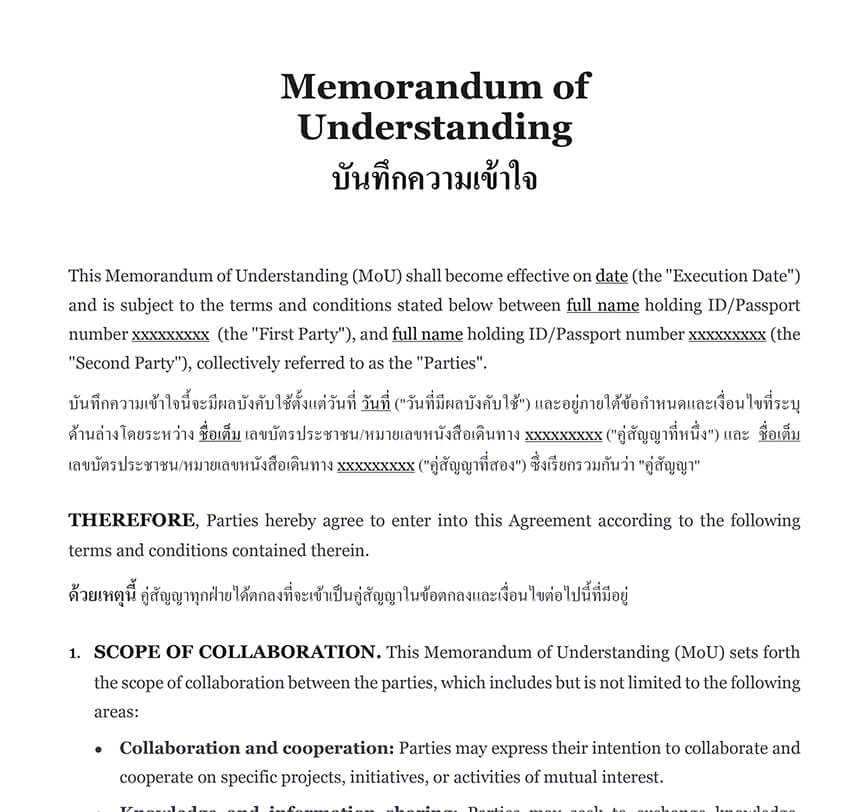Ready to use legal template
Drafted by experienced lawyers
Certified Thai-English translation
Ready to use legal template
Drafted by lawyers
Translated in Thai-English
Home › Business contracts › Memorandum of Understanding
Learn more about Memorandum of Understanding (MOU)
A Memorandum of Understanding (MoU) in Thailand is a vital document that formalizes agreements between parties in various contexts, from business collaborations to government initiatives and international relations. This non-binding yet crucial instrument outlines the terms, objectives, and commitments of the involved parties, setting the stage for cooperation and mutual understanding. At Themis Partner, we understand the significance of MoUs in facilitating harmonious partnerships. That’s why we provide an easily customizable legal template, meticulously crafted by experienced lawyers to align with Thailand’s legal framework. Our template simplifies the process of drafting an MoU, ensuring it accurately represents the parties’ intentions while offering legal safeguards.
Table of contents
-
What is a Memorandum of Understanding (MoU)?
-
Why to use this MoU template in Thailand?
-
How does an MoU differ from a formal contract in Thailand?
-
Is an MoU legally binding in Thailand?
-
What are the common uses of MoUs in Thailand?
-
Can an MoU be converted into a formal contract in Thailand?
-
What happens if parties fail to follow the terms of an MoU?
What is a Memorandum of Understanding (MoU)?
A Memorandum of Understanding (MoU) is a formal written document that outlines the terms, objectives, and commitments of an agreement or partnership between two or more parties. While an MoU is a legally recognized document, it is typically not legally binding by nature, meaning that it does not create enforceable obligations in the same way a contract does. Instead, an MoU serves as a statement of intent, clarifying the parties’ shared goals and responsibilities. MoUs are commonly used in various contexts, including business collaborations, government initiatives, research projects, and international relations, to formalize cooperation, outline expectations, and establish a framework for collaboration while allowing flexibility and a degree of informality.
Why to use this MoU template in Thailand?
Using an MoU template specifically designed for Thailand, such as the one offered by Themis Partner, offers several advantages and reasons:
| ➤ Legal Compliance: The MoU template is drafted by experienced lawyers who are well-versed in Thai laws and regulations, ensuring that the document complies with the legal framework in Thailand. This helps parties avoid potential legal issues and ensures that the MoU is recognized and accepted under Thai law. |
| ➤ Time and Cost Efficiency: Drafting a legal document from scratch can be time-consuming and costly. The template provides a ready-made, easily editable document, saving parties time and legal expenses. |
| ➤ Clarity and Consistency: The template ensures clarity and consistency in the language and format of the MoU, making it easier for parties to understand the terms and ensuring that the document is well-structured. |
| ➤ Customization: While the template provides a standardized framework, it also allows for customization to suit the specific needs and objectives of the parties. This flexibility ensures that the MoU reflects the unique terms of their agreement. |
| ➤ Legal Safeguards: The template can include legally binding clauses where necessary, allowing parties to establish enforceable obligations within the MoU, providing an added layer of protection. |
| ➤ Ease of Use: The template is user-friendly and designed to be easy to edit, even for individuals without legal expertise. This accessibility enables parties to create a tailored MoU without the need for extensive legal knowledge. |
| ➤ Documentation: Having a professionally drafted MoU in writing provides a clear record of the parties' intentions and commitments, reducing misunderstandings and disputes in the future. |
| ➤ Trust and Professionalism: Using a well-drafted MoU template demonstrates professionalism and seriousness in the collaboration, building trust between the parties and enhancing the credibility of their agreement. |




